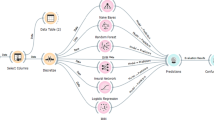Abstract
The number of students enrolling in higher education institutions in South Africa has increased from the year 1994; however, many of these students get academically excluded. Machine learning techniques, along with statistical analysis and data mining, are one of the most important ways to study student performance and success. This paper aims at forecasting students second-year outcomes, to deduce if they are at risk of getting academically excluded or will proceed to register for the following academic year. This way, students who are at risk can be provided with support to avoid being academically excluded. Six predictive models, namely the K-nearest neighbours, random forest, decision trees, naive Bayes, logistic regression and multilayer perceptron, were trained. The random forest proved to be a good classification model amongst the others with an accuracy of 83%, precision of 83%, recall of 82% and an F1 score of 83%. The significance of this study is to promote student success initiatives in higher learning institutions to enhance throughput rates.
Access this chapter
Tax calculation will be finalised at checkout
Purchases are for personal use only
Similar content being viewed by others
References
Koen C, Cele M, Libhaber A (2006) Student activism and student exclusions in South Africa. Int J Educ Dev 26:404–414
Rooney C, Van Walbeek C (2015) Some determinants of academic exclusion and graduation in three faculties at UCT
Zhang G, Anderson TJ, Ohland MW, Thorndyke BR (2004) Identifying factors influencing engineering student graduation: a longitudinal and cross-institutional study. J Eng Educ 93(4):313–320
Poggendorf BP (2013) Exploring predicted versus actual first-to-second year retention rates: a study of evangelical Lutheran church in America colleges. Ph.D. dissertation
Anand P, Herrington A, Agostinho S (2008) Constructivist-based learning using location-aware mobile technology: an exploratory study. In: EdMedia+ innovate learning. Association for the Advancement of Computing in Education (AACE), pp 2312–2316
Mngadi N, Ajoodha R, Jadhav A (2020) A conceptual model to identify vulnerable undergraduate learners at higher-education institutions. In: 2nd International multidisciplinary information technology and engineering conference (IMITEC). IEEE, pp 1–8
Tinto V (1975) Dropout from higher education: a theoretical synthesis of recent research. Rev Educ Res 45:89–125
Buraimoh E, Ajoodha R, Padayachee K (2021) Prediction of student success using student engagement with learning management system. In: Interdisciplinary research in technology and management. CRC Press, pp 577–583
Abed T, Ajoodha R, Jadhav A (2020) A prediction model to improve student placement at a south African higher education institution. In: 2020 International SAUPEC/RobMech/PRASA conference. IEEE, pp 1–6
Pal AK, Pal S (2013) Analysis and mining of educational data for predicting the performance of students. Int J Electron Commun Comput Eng 4(5):1560–1565
Yehuala MA (2015) Application of data mining techniques for student success and failure prediction (The case of Debre Markos University). Int J Scie Technol Res 4(4):91–94
Mngadi N (2020) A theoretical model to predict undergraduate learner attrition using background, individual, and schooling attributes. Ph.D. dissertation (2020)
Philippou N, Ajoodha R, Jadhav A (2020) Using machine learning techniques and matric grades to predict the success of first year university students. In: 2nd International multidisciplinary information technology and engineering conference (IMITEC). IEEE, pp 1–5
Pal M (2005) Random forest classifier for remote sensing classification. Int J Remote Sens 26:217–222
Asif R, Agathe M, Syed AA, Najmi GH (2017) Analyzing undergraduate students’ performance using educational data mining. Comput Educ 113:177–194
Pham DT, Ruz GA (2009) Unsupervised training of Bayesian networks for data clustering. Proc Roy Soc A: Math Phys Eng Sci 2109:2927–2948
Waikato environment for knowledge analysis. https://weka.sourceforge.io/doc.dev/weka/classifiers/functions/MultilayerPerceptron.html
Acknowledgements
This work is based on the research supported in part by the National Research Foundation of South Africa (Grant number: 121835).
Author information
Authors and Affiliations
Corresponding author
Editor information
Editors and Affiliations
Rights and permissions
Copyright information
© 2023 The Author(s), under exclusive license to Springer Nature Singapore Pte Ltd.
About this paper
Cite this paper
Kubayi, S.C., Jadhav, A., Ajoodha, R. (2023). A Machine Learning Approach for Predicting Students’ Second-Year Outcomes. In: Kumar, S., Hiranwal, S., Purohit, S.D., Prasad, M. (eds) Proceedings of International Conference on Communication and Computational Technologies . Algorithms for Intelligent Systems. Springer, Singapore. https://doi.org/10.1007/978-981-19-3951-8_41
Download citation
DOI: https://doi.org/10.1007/978-981-19-3951-8_41
Published:
Publisher Name: Springer, Singapore
Print ISBN: 978-981-19-3950-1
Online ISBN: 978-981-19-3951-8
eBook Packages: Intelligent Technologies and RoboticsIntelligent Technologies and Robotics (R0)




